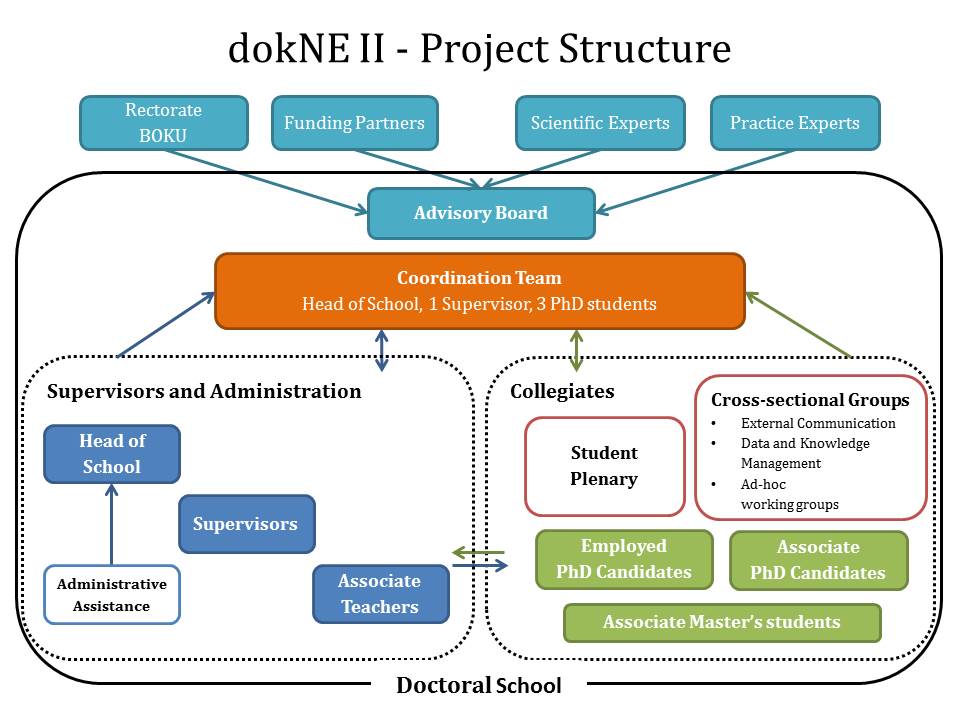The project structure of dokNE II comprises supervisors and administrative personnel, collegiates, a coordination team and an advisory board (see figure).
Collegiates are separated into employed and associate PhD candidates. Employed PhD candidates are supported by funding, either by BOKU or funding partners. The projects of the associate PhD candidates are not funded, but these collegiates have access to scholarships for their studies and research. Like the employed candidates they also take part in all dokNE activities, but do that on their own authority. Within dokNE there is a possibility to award scholarships to associated master theses, which each PhD candidate can make use of, if relevant for the given research design.
The head of school, another supervisor and three PhD candidates constitute the Coordination Team. It is responsible for taking operational decisions, preparing base-materials and considering more general questions for the plenary; in addition, it serves as a bridge between the supervisors and collegiates.
All PhD candidates are members of the Student Plenary. The Plenary provides an open platform for articulating and discussing individual and common interests and concerns and aims to provide input for the work of cross-sectional groups and the coordination team. Each student also participates in one of the three ‘cross-sectional groups’, which are dedicated to specific and crucial functions and services of the doctoral school. The External Communication group is responsible for public relation issues (e.g. homepage, press articles), the Data and Knowledge Management group tackles issues like internet forum or wiki set-up and the Common Ground group addresses issues like the mission statement and common definitions of key aspects of the doctoral school.
Collegiates receive feedback from the supervisor team on a regular basis. In addition, associate teachers contribute to the knowledge of the doctoral candidates, especially in the field of inter- and transdisciplinary research. The head of school, in addition to his function as a supervisor and formal superior of employed PhD candidates, is responsible for the budget and the selection and organization of teaching classes. He is supported by an administrative assistant in the associated administrative work.
All dokNE members participate in an annual retreat outside of Vienna. In a relaxed atmosphere, workshops are conducted cooperatively by supervisors and students. These workshops help to set up and revise the organizational structure of the doctoral school and, importantly, to reflect on the past achievements and set-backs. In addition, students can present their research concepts, progress and findings. The retreat also offers the possibility to strengthen the academic as well as social ties between all participants.
In addition to the internal circle of supervisors, an external evaluation body is set up to oversee the doctoral school. Collegiates are continously receiving constructive feedback from an independent Advisory Board, which regularly provides critical input with respect to both the doctoral school’s development and the individual PhD-projects. Members of the Advisory Board are the Vice-Rector for research (BOKU), funding partners and external international experts from the scientific community, as well as practice experts from Austria.
The structure of the doctoral school provides for focused study and research at BOKU and optimal support of an interdisciplinary team of supervisors. This serves, among other, to enable joint planning of research and teaching contents in order to facilitate integration of current developments and innovative ideas of the collegiates.











